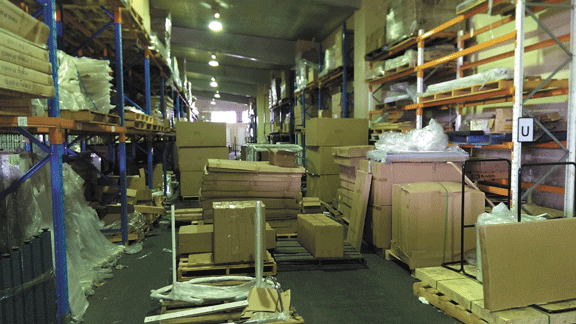‘A matter of time before someone is killed’

Scattered across suburbs throughout Australia are thousands of small factories and warehouses. These are amongst the most dangerous places to work in the country.
Too often unhindered by the union presence more common at larger sites, the two-bit managers and bosses who run these shops routinely ignore basic safety standards.
According to the national policy and research body Safe Work Australia, employees working in transport and storage submitted the most serious injury claims of any industry in Australia, and manufacturing workers the third-most.
Red Flag has gone inside one such small non-union factory and warehouse in the Melbourne suburb of West Heidelberg to report on safety standards typical in such sites.
Workers at the metal shopfitting factory and warehouse unload shipping containers filled to the roof with boxes. Barely two are the same shape or weight. In pairs, by hand, they remove boxes weighing more than 110kg. Temperatures in the dark metal containers can approach 50 degrees in summer.
It’s hardly any more comfortable in the warehouse, which can easily reach 40 degrees on a hot day. When it’s busy, the aisles are packed with pallets, discarded packaging and rubbish – picking and packing is more like scavenging through a tip than working in a warehouse.
It was reported that a few weeks ago a worker had a load of steel slam into his leg after it fell off a swerving forklift. Though his leg was quickly black with bruising, he finished his shift only for the manager to throw a tantrum when he refused to stay for overtime.
The factory attached to the warehouse is a dirty, formidable obstacle course of exposed electrical cords, discarded scrap metal and rubbish. Forklifts drive freely around the area where 10 to 15 people work. Machinery is decades old. A sheet metal folder has no hand guards because, management says, it was built before they were legally required.
The conditions render accidents virtually inevitable. Workers there tell an array of horror stories: a hand crushed by a spot welder, fingers severed by the guillotine.
Just a few weeks earlier, a high pressure air hose strapped to the ceiling with plastic ties snapped free. Workers reported that the hose flew wildly around the factory like a heavy rubber horse whip.
Everyone working on the factory floor knows that the loose hose should be secured with steel brackets or straps. Yet no one was surprised to see management reattach the hose with the very same plastic ties it had just snapped. “It’s only a matter of time before someone is killed here”, said one worker.
Speaking to Red Flag, an NUW health and safety support officer (who preferred not to be named) said that recorded statistics underestimate the dangers of working in smaller non-union factories and warehouses.
“Bosses will mouth platitudes about safety, but it comes a very distant second to getting the work out and making money. Many of these [small] sites have no OHS structures. The ones that do are specifically structured to have tame safety representatives – supervisors or workers who are compliant with the bosses.”
In small, unorganised shops, “Workers frequently report claim suppression and false notices from managers about ‘injury free days’”, the officer said.
“The smaller the employer, the more likely it is that there will be safety incidents”, said Margot Hoyte, OH&S and workers’ compensation officer at the ACTU. “Smaller workplaces are less likely to identify the need for health and safety, and less likely to take steps to address safety issues.”
In West Heidelberg, workers gathered at a health and safety meeting were blithely lectured about ways they could accept accept responsibility for their own safety.
“Look, I know you guys have brought up a series of safety issues, and I know that nothing has been done about them, but keep bringing them up”, the manager said. “Look out for each other and everything will work out”, was the advice doled out.
The older workers in the factory say that the precursor to the situation today was the removal of open trade unionists from the site after a dispute about a decade ago. Those who remained and new starters have been afraid of joining the union or taking action to address conditions, instead submitting to an atmosphere of the bosses’ making.
Workers need their own health and safety representatives and strong union organisation on the shop floor to enforce decent and humane working conditions – obviously no one else will.